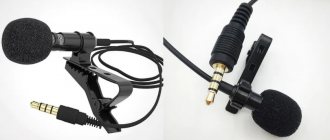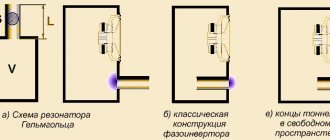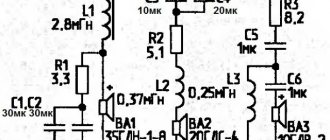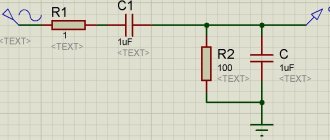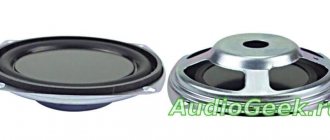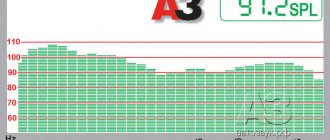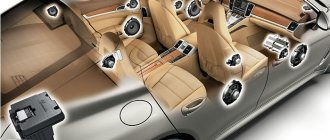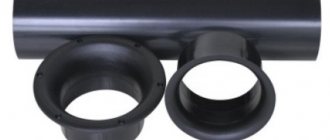The background in car speakers is characteristic sounds or various hisses, for example, you can hear a squeak in the speakers when the engine speed increases, the sound will increase with the speed, and when the speed decreases, the sound in the speakers decreases. Let's try to understand the intricacies of third-party noise produced by speakers, and why they may appear.
Why does background noise appear in car speakers when installing a digital TV tuner or speaker system and how can it be removed?
How to get rid of noise and background in car speakers
Crosstalk, noise, and background noise when the engine is running are common problems not only for novice car audio enthusiasts. They may appear after the system is turned on for the first time, or they may appear completely unexpectedly - “Yesterday it didn’t happen, but today it appeared. I didn’t touch anything at all.”
The network is full of lengthy materials on how to find the cause and combat these unpleasant phenomena. Go through the checklist below and in most cases you will be able to solve the background or interference problem.
IMPORTANT! Carry out all switching on a de-energized system. Not just turned off, but de-energized.
Possible causes, tips and tricks to resolve the problem
Apparently, many have encountered the fact that in speakers connected to computers, amplifiers, stereo systems and other household appliances, extraneous noise, usually called interference or background, can sometimes appear. But why do speakers make noise, for example, if you just purchased and connected them? Why does noise appear not immediately, but over time? And in general, how to get rid of this scourge? Let's try to identify the main reasons for this phenomenon, and then decide on some of the most effective methods that will help correct the situation.
Main reasons
The main reason for the appearance of extraneous noise and distortion is believed to be the occurrence of various types of interference. This may be due, say, to incorrect settings of the connected microphone, incorrect grounding of the wires, incorrect connection of the speakers to the signal source, and in general, to the fact that the speakers themselves have become unusable, not to mention the main sound-reproducing equipment.
Why do speakers make noise from an amplifier: physical problems
The greatest number of problems are observed with household amplifiers, since in the same outdated models, connecting acoustics is usually done exclusively using wires. It is quite possible that the cables are not shielded well enough, the plugs do not fit completely into the corresponding sockets, etc. Sometimes the answer to the question of why speakers make noise is even simpler.
Wiring Location
A common cause of hum, interference and noise is the close location of speaker and interconnect cables to the power cables, or to the standard wiring of the car (this also includes chargers, navigators, etc.). When installing, pull them along different sides of the body, and if intersections cannot be avoided, then place the interblocks and speaker wires at right angles to all the others.
Additional options
If you are figuring out why the speakers started humming, but you haven’t noticed this before, apparently, it may be related to the sound card.
Using the standard Device Manager, try updating your sound card drivers, and if you are using speakers connected via USB ports, perform similar procedures for the corresponding controllers. Sometimes plugging the speakers into a different port helps. But if necessary, it’s also worth checking the ports themselves (in the sense of “checking” them).
Note: to make it easier for you to update your control software, it is better to use automatic update programs like Driver Booster.
Basic installation rules:
- First rule. In order for car audio to be as pure as possible, you need to purchase the highest quality power cables and speaker/interconnect wires. If funds are limited, the main emphasis should be on interconnect cable connectors. During operation of a vehicle, its electrical system inevitably creates electromagnetic fields varying in quantity, power and frequency characteristics. They are the main cause of noise that penetrates poorly made screens on RCA cables.
- Second rule. The interconnect cables should be laid in such a way that they are located as far as possible from other elements of the vehicle's electrical wiring. And also they should not be close to the power wires leading to the sound system. It should be noted that the penetration of interference will be reduced if the intersection of speaker wires and power cables is mounted at a right angle.
- Third rule. Never purchase RCA cables that are too long to spare. The shorter the length, the less likely it is to generate electromagnetic interference.
- Fourth rule. A well-designed installation of a car audio system involves grounding all elements of the system at only one point. Otherwise, when components are grounded in randomly selected places, so-called “ground loops” appear, which are the main cause of interference when playing music.
We discussed in more detail how to properly connect an amplifier “here”.
Tags: oo
Comments 37
Hello, I have speakers through an amplifier to the radio, but the noise comes only on one side, I pull out this tulip, the noise goes away, I tried to wrap it around ground, the noise doubles. When the car is turned off, there is a hum from this speaker; when I start it, I listen to the engine. What can you think of?
In the end, how did you solve the problem?
Guys, tell me, is it dangerous to listen to music with the RCA mass connected to the GU mass. If yes, then with what? and how can I solve this problem correctly?
How to get rid of noise?
We have figured out the causes of noise and tips for proper installation of wires and equipment. Let's consider further what tactics should be followed in cases where, for example, the engine picks up speed, provoking the appearance of noise and interference?
The solutions are described below:
- Disconnect the head unit from the audio system. If there is no noise, the head unit should be grounded to a common point on the body that is used by other acoustic components.
- If the noise continues and the components are grounded in different places, take a multimeter and check the voltage between the ground points of all components and the grounded terminal of the battery. If a difference is detected in the results obtained, the voltage between all components should be equalized. A good solution in this case is to ground all components in one place, or find an alternative place where the voltage between the components will not differ. There must be a minimum voltage level between all system enclosures. The readings are checked by measuring the difference in voltage between the shields (braids) found in RCA cables in any combination.
- If an absolutely minimal result in the voltage difference is detected during a test with a multimeter, noise from interference may appear for a number of other reasons: The first of them can be called the close location of the RCA wires to the power cables. Make sure the quality of the RCA components - problems usually appear due to the installation of a cheap budget wiring. The second reason may be the parallel and close arrangement of the acoustic wires to the power cable, or failure to maintain the right angle of intersection. And also make sure that the amplifier case is properly insulated. Additionally, a poorly grounded antenna can create loops and cause interference. The last reason may be the presence of contact between the speaker wire and the vehicle body.
Why does the radio sound?
There are several reasons why this problem may occur. The first of them is the occurrence of interference due to contact of the amplifier body with the body or unreliable antenna shielding. In this case, when listening to a radio station with a mediocre signal level, a squealing or crackling noise will be heard when the engine is running. If you press the gas pedal, the frequency of the strong background will increase in accordance with the engine speed.
The background often appears due to the induction of high-voltage discharges created by the ignition system of a gasoline engine. Also, the level of crackling noise from car media system speakers increases due to the use of low-quality high-voltage wires and faulty spark plugs. The cause of a monotonous squeak or squeal from the speakers may be a faulty generator. Interference provokes sparking brushes, worn commutator plates, and a short circuit in the stator winding.
Also, a strong background appears due to a malfunction of the radio, for example due to the drying out of the filter capacitor in the power circuit.
In this case, the radio freezes and reacts sensitively to all sources of interference in the car, including the DVR or radar detector.
Some media systems have a line wire fuse, which is placed between the ground on the board and the side terminals of the RCA sockets. When the negative wire of an amplifier connected in this way leaves, this fuse blows so that current does not flow through the interconnections of the radio.
In this situation, the linear outputs turn out to be ungrounded, which is why the radio sounds in any operating mode.
The interference is induced on the cables connecting the amplifier to the car radio. Other problems include loose connectors or damage to the screen shell. If there is strong interference when starting the engine, then the starter is to blame. Brushes can also spark in it.
conclusions
If there is a whistle or additional problems with the speakers, be sure to check the layout of the speaker system in your vehicle. Failure to follow recommendations or use of low-quality or damaged materials is guaranteed to create big problems in the operation of the stereo system. We hope we helped you understand the potential causes of poor sound from speakers and were able to indicate the right ways to eliminate all troubles!
I recently installed a 4-channel amplifier in my car and connected all the speakers and a subwoofer to it. Everything played fine until I started the engine. When the engine was running, there was a terrible whistling sound in the speakers; as the speed increased, the whistling became stronger. With the engine off everything is fine. I began to figure out what the problem was. I took off the radio, disconnected the tulips from it, the whistle disappeared. I connected the phone through the adapter and turned on the music, there was no extraneous noise.
I decided to modify the radio
After numerous attempts with soldering diodes, capacitors, installing ready-made and homemade filters, even connecting directly in front of the microcircuit with operational amplifiers, nothing has changed. I went to the market and bought a new radio. Installed it, started it, the whistle remained, but became quieter. I turned gray, thought, and turned off the excitation from the culprit of all these problems - the generator. Started it up and the whistle disappeared.
I removed the generator to check.
I checked the diode bridge, stator and rotor windings, checked the capacity of the noise suppression capacitor, the integrity of the self-inductance voltage suppressing diode in the voltage regulator - everything is normal. The voltage regulator also worked properly, since before that it measured the voltage with the engine running - a stable 14.4 V. After analyzing all the above factors, it was concluded that the whistle was caused by the operation of the voltage regulator itself. To do this, I decided to modify the voltage regulator and install an electrolytic capacitor and an additional diode in the excitation winding circuit (inductor - rotor).
For complete clarity of the picture, you need to understand how the generator works
The simplest alternating voltage generator (which turns into direct voltage using a diode bridge) consists of a winding (stator - armature) and a magnet (rotor - inductor) that rotates inside it. But the problem is that the voltage depends on the rotor speed, the load on the generator and the magnitude of the magnetic flux of the rotor itself. The higher the rotor speed, the higher the voltage at the terminals of the stator winding. The greater the load, the lower the voltage at the terminals of the stator winding. The greater the rotor magnetic flux, the higher the voltage at the terminals of the stator winding. In order to keep the voltage at the same level, the rotor speed should not change, which in the case of a car is impossible, and the load on the generator should not change, which, in the case of a car, is also impossible, since the car equipment does not work constantly (stop signal, turns, headlights, music and much more). Based on this, the only solution turned out to be to change the value of the rotor magnetic flux. This is not possible with permanent magnets, but it is possible with an electromagnet. The magnitude of the magnetic flux depends on the strength of the current that flows through the winding of this magnet. And the current in the winding is regulated by the voltage regulator.
What to do
First of all, all car radio wiring is checked for damage. If the antenna plug is not seated tightly, it should be removed and cleaned of dirt and oxides. If the screen shell of the radio frequency cable is damaged or torn, the plug must be re-soldered. If the background does not disappear, then the generator is checked for wear of the brushes and commutator.
If interference occurs when the engine starts, the starter is checked. Defective parts are replaced in all cases. The spark plugs and high-voltage wires should be checked. If breakdowns and cracks are detected, parts are replaced. Line output connections are also inspected, cleaned and crimped. Power circuits are checked for connection reliability.
Another way to solve this problem is to connect the radio to another point, for example directly to the battery. To replace the line output fuse, you can contact a service center. To eliminate the background, you need to follow a simple rule: you should not lay the car radio wires in the car next to the harnesses of the ignition and engine control systems.
Motorists of our time believe that any Chinese-made product is a cheap fake that does not deserve attention. Maybe in ancient times China produced mass production of low-quality products, but now everything has changed. As the years go by, Chinese manufacturers make technological breakthroughs, thereby improving the quality of products produced in their factories. Therefore, at the present time, Pioneer radio tape recorders are very high-quality media systems, taking precedence over their competitors in terms of price.
The Pioneer radio tape recorder stands out from the general list with its high-quality sound and enormous functionality. But with frequent use, some difficulties arise. One of which is that the radio in the car starts making noise.
Car radio
Car speakers make noise when the engine is running
AutoSaratov > Automotive > AutoSound > Cracking in the speakers when the engine is running
View full version : Cracking noise in the speakers when the engine is running
A crackling sound appeared in the speakers when the engine was running, when you turn off the engine, the crackling noise disappeared and everything played fine. Car VAZ 2107 carburetor. Music: head pioneer 5450, amplifier KIX 45, front Hertz, sub and rear speakers JBL; The sub and front play from the amp, and the rear ones just come from the head. I read on various forums that the problem was in the ignition system and changed everything that was recommended to me: spark plugs, high-voltage wires, slider. I also changed the capacitor on the generator. But nothing helped, the crackling remained. I tried turning off the amplifier and there was a crackling sound even in those speakers that even just played from the head. The mafon is connected directly from the battery. Maybe someone can advise what else to do. Thank you in advance
A crackling sound appeared in the speakers when the engine was running, when you turn off the engine, the crackling noise disappeared and everything played fine. Car VAZ 2107 carburetor. Music: head pioneer 5450, amplifier KIX 45, front Hertz, sub and rear speakers JBL; The sub and front play from the amp, and the rear ones just come from the head. I read on various forums that the problem was in the ignition system and changed everything that was recommended to me: spark plugs, high-voltage wires, slider. I also changed the capacitor on the generator. But nothing helped, the crackling remained. I tried turning off the amplifier and there was a crackling sound even in those speakers that even just played from the head. The mafon is connected directly from the battery. Maybe someone can advise what else to do. Thanks in advance. I told you, clean all the contacts, run a normal power cable to the radio, etc. Then he also told me what to do.

